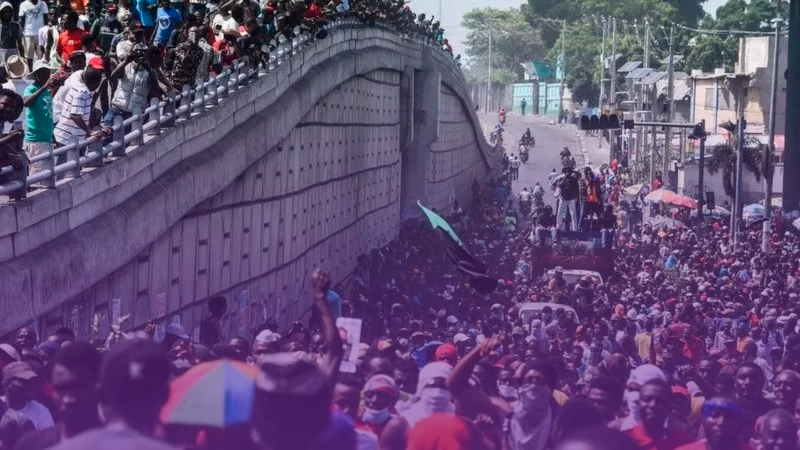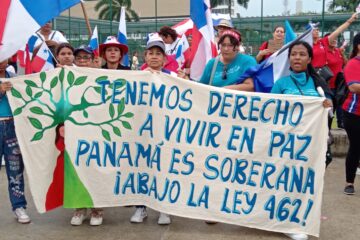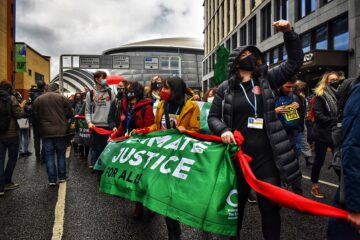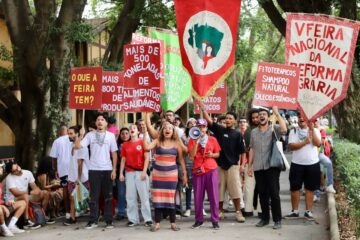Haiti is “an object of regional concern,” as a famous Haitian political scientist put it. Violence and massacres, an increasing number of armed gangs, economic crisis, humanitarian crisis… One case deserves international attention. With such a “postcard,” what is really happening in the country is hidden from public opinion: a grassroots mobilization by citizens since July 2018 has become a continuous effort, even though it has been classified in a variety of ways, as marches, sit-ins, petitions, legal demands, and not just occupations and street blockades. By isolating and reducing everything to “spectacular” demonstrations (with burning tires and tear-gas crackdowns, its political substance is hidden and an entire social movement that is making demands is criminalized nationally.
In fact, what we have today is a multifaceted social movement that is the outcome of the gradual collapse of the state in Haiti. Previous social movements presented social demands to an exclusive, closed state that is insensitive to the general interest. The interventions we have experienced in the recent past in Haiti have changed the situation both from the point of view of its historic evolution and the evolution of the forms of mobilization. The persistence of the majorities in taking part in the election of their leaders and the protection from natural disasters and political vicissitudes—the development of which is beyond the scope of this space—are in opposition to national oligarchies supported by the ruling powers in Haiti, starting with the United States.
These oligarchies are trying to reestablish traditional resources of the Duvalierist dictatorial power that ruled Haiti for nearly 30 years, from 1957 to 1986. This is how many of us see the political party PHTK [Parti Haitien Tet Kale—Haitian Party of Baldheads],1 imposed through an electoral process in 2011, only a year after the earthquake. It is an attempt to restore some kind of neo-Duvalierism of the 21st century—that is, to use the legal, electoral, and communications apparatus instead of a mere military repression. Since that moment and for approximately eight years, there has been a kind of unrest in society.
As traditional politicians are powerless, unable to face this new power or in consonance with it, a social movement starts to build up, now with a more radical goal: to change the system.
This system is no longer possible, we can no longer take this system. This has been a long and convoluted process, because Haiti’s civil society does not have a strong tradition in terms of organizing. We have a long tradition of mobilization, of insurrection, but not a lot of practice in terms of organizing. Political organizations are young and still fragile, yet we have today a social movement with powerful demands, which really rejects any partial recomposition of a state that, by the way, does not exist anymore in any of its institutional characteristics.
Since early 2020, state institutions have been completely destroyed—no parliament, no court system, no municipal or local authorities—and their foundations have been attacked, as the public administration was brought to a halt. The police are weakened, political, and corrupted by crime. Amid this landscape, a social movement emerges claiming, “we have to do something different”—but what? How?
Responses must go beyond a partisan point of view, providing a real analysis of the power of a movement that emerges from civil society and joins progressive political forces, which—we must admit—are still being built. The Grassroots Patriotic Front [Front Patriotique Populaire] is an example, maybe the most advanced one. Other two organizations are the People’s Sectors’ Roots Party [Rasin Kan Pep La] and the Socialist Alternative [Altenativ Sosyalis].
Challenges of Mobilizations
This civic movement spearheaded what has become a national agreement with two main (and many other) goals. The first goal is to restore the country’s sovereignty, because the ones intervening to deteriorate this state are, firstly, imperialist powers and what has been called the international community, which does not care about political paths that steer clear from dependency. So the first demands are “no more intervention” and “no more tutelage (whether or not it says its name).” Now we want to rebuild our state in a sovereign manner.
We are talking about basic demands, such as education, health care, and sanitation. While they are basic, they are precisely the essence of what builds citizenship and what has been missing to support the nation. Just to paint a picture, only 16 percent of the national budget is allocated for education and only… 4.3 percent for health care! The top priority today is to rebuild a state structure that can allow the provision of services to the entire society. We are not just talking about legitimacy: we all know that the current power is not legitimate, but it is also not capable of minimally recomposing the ordinary management of society, the economy, and the bases that constitute us. We want to recompose the institutions and discuss what kind of state and society we want. This is very different from the rush to rearrange authorities from formal institutions in a structure that society already said we do not want anymore. We have the ability, but we want the possibility to design a project that is, first and foremost, pro-majorities. This is an ambitious project considering the history of social movements in Haiti.
We are an important and diverse political actor that is flourishing because we are side by side with these demands by the majorities: unions, workers, women’s organizations, peasant organizations.
The second goal is to fight oblivion and silence. Every once in a while, the mainstream media talks about violence and humanitarian needs, but they do not address the citizen resistance that has built this country, even though it is economically and politically isolated. What we need is active solidarity that respects political spaces and actors and is capable of following the Haitian people wherever necessary, to where foreign interests that want to be in charge will not give the orders. It is, after all, about avoiding tutelage. The Haitian people does not want to be under the tutelage of any powers, no matter how good their intentions may be.
_____
Sabine Manigat is a member of the Grassroots Patriotic Front. She is a sociologist, professor, and researcher at Haiti’s Quisqueya University.
- The name “Haitian Party of Bald-heads” (Parti Haïtien Tèt Kale — PHTK) pays tribute to Michel Martelly, a former president of Haiti known for his bald head. Martelly held office between 2011 and 2016, when an electoral crisis ensued in the country. [↩]




